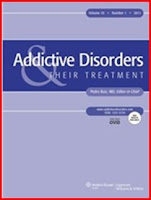An international website dedicated to providing current information on news, reports, publications,and peer-reviewed research articles concerning alcoholism and alcohol-related problems throughout the world. Postings are provided by international contributors who monitor news, publications and research findings in their country, geographical region or program area of interest. All postings are entered without editorial or contributor opinion or comment.
Aims
To support the free and open dissemination of research findings and information on alcoholism and alcohol-related problems. To encourage open access to peer-reviewed articles free for all to view.
For full versions of posted research articles readers are encouraged to email requests for "electronic reprints" (text file, PDF files, FAX copies) to the corresponding or lead author, who is highlighted in the posting.
___________________________________________
For full versions of posted research articles readers are encouraged to email requests for "electronic reprints" (text file, PDF files, FAX copies) to the corresponding or lead author, who is highlighted in the posting.
___________________________________________
Monday, May 30, 2011
Changes in Affect and Drinking Outcomes in a Pharmacobehavioral Trial for Alcohol Dependence
Despite extensive research exploring affect in alcohol-dependent individuals in recovery, empirical research on affective changes over the course of psychosocial treatment and their role on drinking outcomes has been minimal. The present study examined the relationship between changes in positive affect (PA), negative affect (NA), and drinking outcomes during a pharmacobehavioral trial.
Data for these post hoc exploratory analyses were derived from a clinical trial of 321 alcohol-dependent male and female individuals. The study design had 4 treatment arms for medication: 3 levels of dose of ondansetron as well as a control condition (placebo). All participants received weekly cognitive behavioral therapy for 12 weeks. We conducted an exploratory evaluation of changes in negative and positive affect and drinking behavior over time during the treatment phase of the trial using multilevel modeling.
Participants experienced substantial reductions in drinking, decreases in NA, and increases in PA over the course of treatment. Individuals who experienced increases in PA over the course of treatment significantly reduced their drinking in subsequent weeks, whereas those who had reductions in NA only experienced reductions in drinking later in treatment if they also reported increases in PA. These results support the role of affect regulation in treatment.
These results suggest that affective change during the course of treatment may serve as 1 potential mechanism of action for changes in drinking behavior. The interaction between reductions in NA and increases in PA may be particularly important in promoting new coping skills and reducing drinking.
Read Full Abstract
Request Reprint E-Mail: Michelle.Vaughan@westminster-mo.edu
